
Related
Topics
Guests
- Frances Fox Pivenprofessor of social and political science at CUNY and author of the landmark Regulating the Poor and many other books and articles on public assistance and public policy.
- Cheri Honkalaexecutive director of the Kensington Welfare Rights Union in Philadelphia, one of the nation’s first welfare rights groups.
In the last two weeks, the thousands of people affected by the attacks on the World Trade Center have received unprecedented levels of assistance from federal, state and local agencies. Agencies have generally made drastic cuts in red tape to facilitate the flow of aid and employed extremely generous standards in determining who receives it, including housing, food and disaster assistance. The aid has gone to victims of the disaster regardless of income. And therein lies the irony, for the Giuliani administration continues to discourage poor people from applying for public aid and housing assistance in New York.
Outside of New York, millions of poor people around the country are running up against federal- and state-imposed time limits on the receipt of public assistance — the result of the infamous 1996 Welfare Act, which placed strict limits on who can receive assistance and for how long. The so-called Welfare Reform Act will come up for reauthorization at a moment when the Bush administration and Congress are pouring billions of dollars into military and intelligence agencies and telling the public that the U.S. is in for a drawn-out military struggle that will require public sacrifice on a number of fronts. But who will be forced to sacrifice the most?
Transcript
AMY GOODMAN: In the last two weeks, the thousands of people affected by the attacks on the World Trade Center have received unprecedented levels of assistance from federal, state and local agencies. Agencies have generally made drastic cuts in red tape to facilitate the flow of aid and employed extremely generous standards in determining who receives it, including housing, food and disaster assistance. The aid has gone to victims of the disaster regardless of income. And therein lies the irony, for the Giuliani administration continues to discourage poor people from applying for public aid and housing assistance in New York.
Outside of New York, millions of poor people around the country are running up against federal- and state-imposed time limits on the receipt of public assistance — the result of the Welfare Act of 1996, which placed strict limits on who can receive assistance and for how long. The so-called Welfare Reform Act will come up for reauthorization at a moment when the Bush administration and Congress are pouring billions of dollars into military and intelligence agencies and telling the public that the U.S. is in for a drawn-out military struggle that will require public sacrifice on a number of fronts. But who will be forced to sacrifice the most?
We’re joined now by Frances Fox Piven, professor of social and political science at CUNY and author of the landmark book, Regulating the Poor, as well as many other books and articles on public assistance and public policy. And Cheri Honkala joins us on the line, who’s head of the Kensington Welfare Rights Union in Philadelphia, one of the nation’s first welfare rights groups.
We welcome you both to Democracy Now!
FRANCES FOX PIVEN: Glad to be here, Amy.
AMY GOODMAN: It’s great to have you. What are your thoughts, first, on welfare and war?
FRANCES FOX PIVEN: Well, it really is a moment of great uncertainty. It could be that the sense of national emergency, the sense that we’re on the brink of war, will lead to a spirit of compassion, and there will be more space for people who are advocates of the poor to raise issues like the increase in poverty that has occurred among single women raising children on their own since welfare reform. That’s on the one hand.
On the other hand, there will be pressure on spending in Washington, because we’re going to have to spend so much on war preparation and making war and on intelligence. It isn’t that welfare spending looms so large in the federal budget. It’s actually a rather small amount. But it’s a relatively easy target for the spending cutters. So, both of those possibilities loom ahead of us. And much depends, I think, on the way in which advocates of the poor, the poor themselves mobilize to enter the political discussion.
AMY GOODMAN: Cheri Honkala, if history is any guide, what do you think we can expect — what can we expect to happen to public assistance to the poor, if President Bush, as he is doing now, mobilizes for war?
CHERI HONKALA: Well, the day that the tragedy happened in New York City, the absolute sadness of poor families all around the country because of the terrible things that had happened to the families that died both in New York City and Washington, D.C., but also there was a great deal of sadness because of the fact that poor families will become ever more so invisible, and the conditions that they face and the issues that they’re up against will virtually be made to, you know, disappear as the media focuses on trying to organize aid for the families that are victims in the situation, as well as Congress talks about gathering tons of money to go to war. You know, we knew that, even before this tragedy happened in our country, that the criminalization of the poor was very much increasing across the country, preparing for the five-year lifetime limit for folks that are on public assistance, because people are having to house themselves any way that they possibly can and feed themselves any way that they can. And the police were already making, you know, things very difficult for families across the country.
AMY GOODMAN: We are watching as the stock market goes down, certainly after the World Trade Center attacks. There was a report — I can’t remember in which of the corporate media networks — talking about the “incident” at the World Trade Center and the Wall Street “massacre,” believe it or not, that framing of it. In the papers today, articles on new economic statistics showing that poverty in the U.S. declined in 2000, with poverty rates of Blacks and female heads of households the lowest on record. At the same time, median income has leveled off after years of growth. And another piece about how more than 100,000 New York City workers are likely to find themselves unemployed, at least temporarily, as a result of the World Trade Center disaster. Frances Fox Piven, you’ve written extensively about the use of public assistance as a means of the state to control poor people’s labor, especially in times of economic downturn. So, can you fit this into this picture now in the wake of the attacks?
FRANCES FOX PIVEN: Well, it’s important to recognize that public assistance is used to control people’s labor, largely by refusing public assistance, and that the most important social control or labor market effects of public assistance occur when public assistance is slashed. And it’s slashed usually to the accompaniment of a great deal of rhetoric blaming the poor for their poverty, tracing poverty to the fact that poor women have too many babies, for example — an old Malthusian argument. And we’ve seen this in the United States, this kind of argument, to almost a drumbeat created by right-wing foundations and right-wing politicians. This argument has prevailed over the last 10 years in the U.S.
So, when we look at the results of welfare reform, which was really welfare cutback, welfare slashing, to channel these impoverished mothers into the low-wage labor market — whether or not they could actually get jobs, they would be looking for jobs — when we look at the results, our politicians tell us, “Well, it’s a success, because so many people are no longer on welfare.” Well, there’s no trick to that. All you have to do is cut them off welfare or refuse them assistance when they try to apply, something that the Giuliani administration is very good at and one of the leaders in the country, actually, at what is called diversion.
The results of that are that many more women are crowding the labor market, scrambling for whatever jobs are available. The results are also that many more women are deeply impoverished, and so are their children. But we don’t look at this, because we’ve been persuaded by the argument that welfare is the problem, that welfare is not good for people, that welfare causes poverty, that welfare causes dependence, that welfare leads women to have out-of-wedlock babies. All of these are arguments for which there is absolutely no evidence, but it does sort of pluck at certain kinds of animosities that are rooted in American culture and in American history. So, if no one else is speaking, and speaking loudly, people go along with that argument.
AMY GOODMAN: What about these hearings in Washington?
FRANCES FOX PIVEN: Well, the hearings so far have been House hearings. The argument that has to be made by advocates for increased generosity to the poor, the argument that has to be made is that the cut in the welfare rolls — more than half the people who were on the welfare rolls are now off the welfare rolls — that this slashing of the welfare rolls is not, by itself, any evidence of success. All it means is that people have been refused assistance. And the reason that we inaugurated welfare programs in this country was because at least at certain periods in our history, we have been convinced that a community owed assistance to those who were worst off in the community. And the promise of this period, this spirit of national emergency, the rise of a spirit of compassion and almost togetherness in the wake of the emergency, is that we will be able to remind Americans that the problem is not just that people got a little bit of assistance from government, but the problem is poverty, the poverty of women and children, who, even when they go to work, only make $6, $7, $8 an hour.
AMY GOODMAN: We’re watching all sorts of legislation being pushed through that doesn’t appear to have any connection to the mobilization for war, but the administration using this as an opportunity, a kind of laying out a wishlist, that they have a window right now where Bush has unprecedented popularity — it may come as a shock to some — something like the most popularity of any president in history, according to polls, and so they’re trying to push through everything they can on every issue, from fast track to getting rid of any restriction on ABM treaties or — where do you see that fitting into your work on the economy and welfare?
FRANCES FOX PIVEN: Well, I think that one of the reasons that Bush is scoring overwhelmingly in the popularity scores is that he has softened his warrior rhetoric and he is talking about other nonmilitary solutions to the terrorist emergency, so that there’s some basis for people thinking that he is indeed a leader, the leader of all the people. Were he to now attack poor women and children, were he to take the kind of line that Gingrich took, for example, in leading the country to the passage of welfare reform, I think he would lose popularity. I don’t think he’s going to do that. One can’t be sure, but I don’t think that he’s going to come down hard on poor women and children.
AMY GOODMAN: Well, I want to thank you very much for being with us and coming over to the firehouse, where we are, in Chinatown.
And speaking of New York politics, we didn’t even mention yet on the program that the primary did take place yesterday. It was suspended on September 11th, the day of the attacks in New York and Washington. And yesterday, the results of that primary were that, on the Republican side, Michael Bloomberg, the billionaire communications entrepreneur, trounced his opponent, Herman Badillo, to become the Republican mayoral candidate in the general election November 6th. And the Democrats extended the primary contest by an additional 16 days because of a runoff, and that runoff will be between Mark Green, who is the public advocate of New York, and Fernando Ferrer. If Fernando Ferrer were to become mayor, the Bronx borough president, he would be the first Latino mayor of New York.
Frances Fox Piven, I want to thank you very much for being with us, a professor at CUNY, at the City University of New York, and also Cheri Honkala, who is the executive director of the Kensington Welfare Rights Union in Philadelphia.
When we come back from our break, we will go to Riverside Church to a major address that was given last night by the Vietnamese Buddhist monk Thich Nhat Hanh in this time of war. Stay with us.

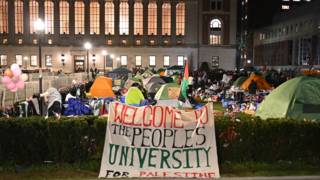
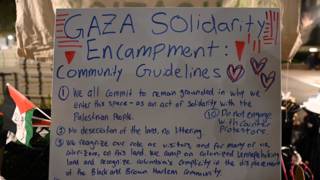
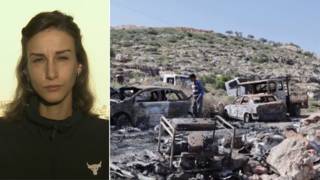
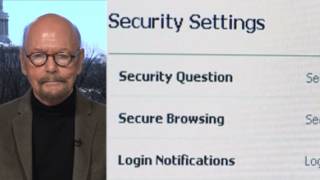





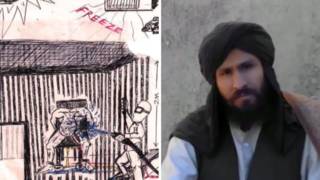

Media Options